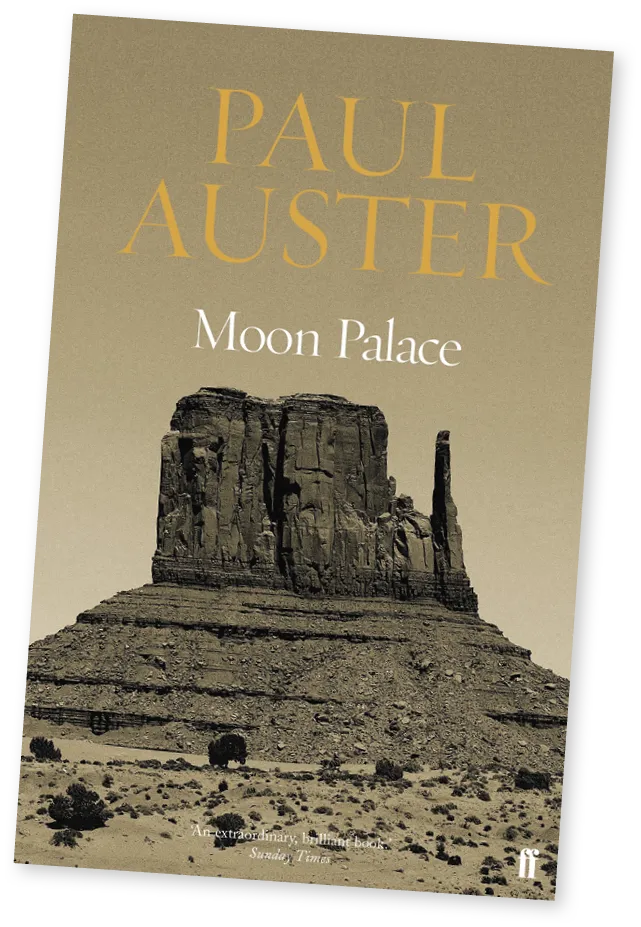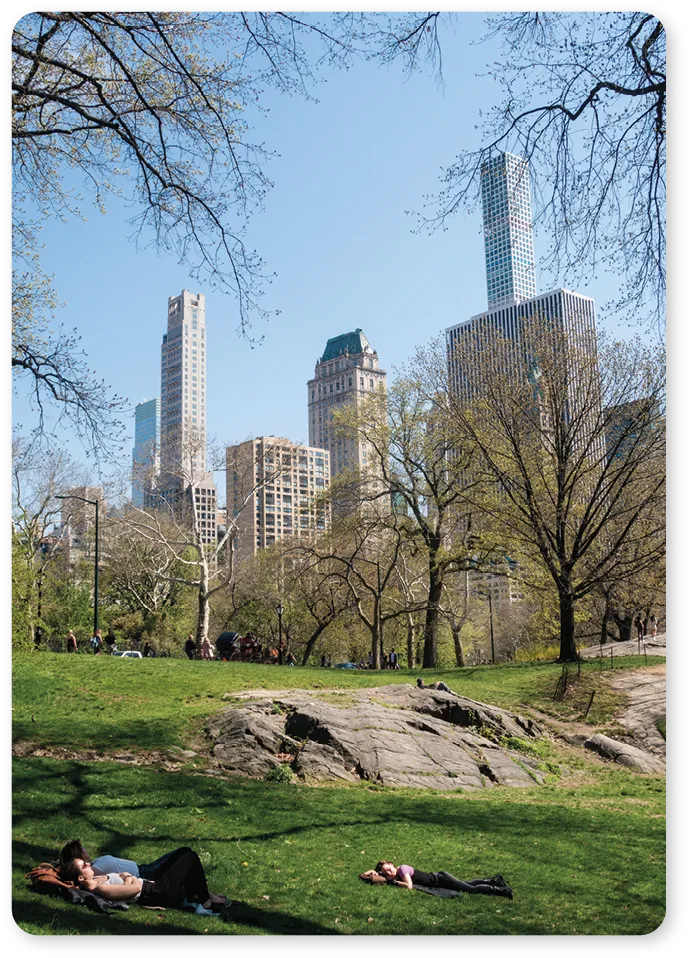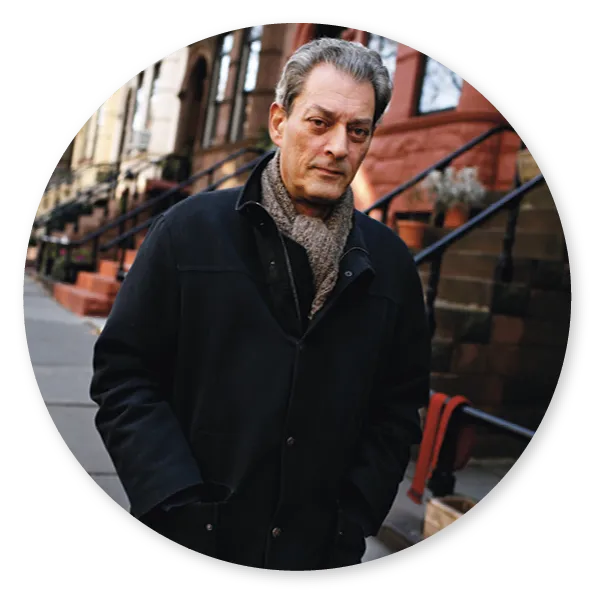Ressource affichée de l'autre côté.
Faites défiler pour voir la suite.
Faites défiler pour voir la suite.
Moon Palace is a novel written by Paul Auster that was first published in 1989. The novel is set in Manhattan and the U.S. Southwest, and
centers on the life of the narrator Marco Stanley Fogg, an orphan, and
his Uncle Victor. Fogg starts college, and nine months later moves from
the dormitory into his own apartment, furnished with 1492 books given
to him by Uncle Victor. Uncle Victor dies before Fogg finishes college and
leaves him without friends and family. Marco inherits some money which
he uses to pay for Uncle Victor's funeral. He becomes an introvert, spends
his time reading, and thinks, “Why should I get a job? I have enough
to do living through the days.” After selling the books one by one in order
to survive Fogg loses his apartment and seeks shelter in Central Park.


Ressource affichée de l'autre côté.
Faites défiler pour voir la suite.
Faites défiler pour voir la suite.
Texte
Moon Palace
I woke up feeling as though I had slept in a boxcar1. It was just past dawn, and my
entire body ached, my muscles had turned into knots. I extricated myself gingerly2 from
the bush, cursing and groaning as I moved, and then took stock of my surroundings.
I had spent the night at the edge of a softball field, sprawled out3 in the shrubbery4 behind home plate. The field was situated in a shallow dip of land, and at that early hour
a speckle of thin gray fog was hanging over the grass. Absolutely no one was in sight. A few sparrows5 swooped and chittered in the area around second base, a blue jay rasped
in the trees overhead. This was New York, but it had nothing to do with the New York I
had always known. It was devoid of associations, a place that could have been anywhere
[...] I had made it through the first night, and if I had done it once, there was no reason
to think I couldn't do it again.
I slept in the park every night after that. It became a sanctuary for me, a refuge of inwardness against the grinding6 demands of the streets. There were eight hundred and forty acres to roam7 in, and unlike the massive gridwork of buildings and towers that loomed8 outside the perimeter, the park offered me the possibility of solitude, of separating myself from the rest of the world. In the streets, everything is bodies and commotion, and like it or not, you cannot enter them without adhering to a rigid protocol of behavior. To walk among the crowd means never going faster than anyone else, never lagging behind your neighbor, never doing anything to disrupt the flow of human traffic. If you play by the rules of this game, people will tend to ignore you.
There is a particular glaze9 that comes over the eyes of New Yorkers when they walk through the streets, a natural and perhaps necessary form of indifference to others. It doesn't matter how you look, for example. Outrageous costumes, bizarre hairdos, T-shirts with obscene slogans printed across them – no one pays attention to such things. On the other hand, the way you act inside your clothes is of the utmost10 importance. Odd gestures of any kind are automatically taken as a threat. Talking out loud to yourself, scratching your body, looking someone directly in the eye: these deviations can trigger off hostile and sometimes violent reactions from those around you.
You must not stagger11 or swoon12, you must not clutch the walls, you must not sing, for all forms of spontaneous or involuntary behavior are sure to elicit stares, caustic remarks, and even an occasional shove or kick in the shins. I was not so far gone that I received any treatment of that sort, but I saw it happen to others, and I knew that a day might eventually come when I wouldn't be able to control myself anymore. By contrast, life in Central Park allowed for a much broader range of variables. No one thought twice if you stretched out on the grass and went to sleep in the middle of the day. No one blinked13 if you sat under a tree and did nothing, if you played your clarinet, if you howled14 at the top of your lungs.
I slept in the park every night after that. It became a sanctuary for me, a refuge of inwardness against the grinding6 demands of the streets. There were eight hundred and forty acres to roam7 in, and unlike the massive gridwork of buildings and towers that loomed8 outside the perimeter, the park offered me the possibility of solitude, of separating myself from the rest of the world. In the streets, everything is bodies and commotion, and like it or not, you cannot enter them without adhering to a rigid protocol of behavior. To walk among the crowd means never going faster than anyone else, never lagging behind your neighbor, never doing anything to disrupt the flow of human traffic. If you play by the rules of this game, people will tend to ignore you.
There is a particular glaze9 that comes over the eyes of New Yorkers when they walk through the streets, a natural and perhaps necessary form of indifference to others. It doesn't matter how you look, for example. Outrageous costumes, bizarre hairdos, T-shirts with obscene slogans printed across them – no one pays attention to such things. On the other hand, the way you act inside your clothes is of the utmost10 importance. Odd gestures of any kind are automatically taken as a threat. Talking out loud to yourself, scratching your body, looking someone directly in the eye: these deviations can trigger off hostile and sometimes violent reactions from those around you.
You must not stagger11 or swoon12, you must not clutch the walls, you must not sing, for all forms of spontaneous or involuntary behavior are sure to elicit stares, caustic remarks, and even an occasional shove or kick in the shins. I was not so far gone that I received any treatment of that sort, but I saw it happen to others, and I knew that a day might eventually come when I wouldn't be able to control myself anymore. By contrast, life in Central Park allowed for a much broader range of variables. No one thought twice if you stretched out on the grass and went to sleep in the middle of the day. No one blinked13 if you sat under a tree and did nothing, if you played your clarinet, if you howled14 at the top of your lungs.
1. wagon.
2. carefully.
3. lounging.
4. bushes.
5. small birds.
6. difficult.
7. walk around.
2. carefully.
3. lounging.
4. bushes.
5. small birds.
6. difficult.
7. walk around.
8. appear large and threatening.
9. empty look.
10. extreme.
11. unsteady walk, as if about to fall.
12. lose consciousness.
13. react.
14. scream.
9. empty look.
10. extreme.
11. unsteady walk, as if about to fall.
12. lose consciousness.
13. react.
14. scream.
Ressource affichée de l'autre côté.
Faites défiler pour voir la suite.
Faites défiler pour voir la suite.


Ressource affichée de l'autre côté.
Faites défiler pour voir la suite.
Faites défiler pour voir la suite.
a) What type of narrative is the text?
Ressource affichée de l'autre côté.
Faites défiler pour voir la suite.
Faites défiler pour voir la suite.
b) Where does the scene take place?
Ressource affichée de l'autre côté.
Faites défiler pour voir la suite.
Faites défiler pour voir la suite.
c) Pick out elements referring to the narrator's surroundings.
Ressource affichée de l'autre côté.
Faites défiler pour voir la suite.
Faites défiler pour voir la suite.
d) What does the narrator compare the park to? Why?
Ressource affichée de l'autre côté.
Faites défiler pour voir la suite.
Faites défiler pour voir la suite.
e) How does the narrator perceive life in the city?
Ressource affichée de l'autre côté.
Faites défiler pour voir la suite.
Faites défiler pour voir la suite.
f) Find reasons why the narrator probably ran away from the city.
Ressource affichée de l'autre côté.
Faites défiler pour voir la suite.
Faites défiler pour voir la suite.
g) In the narrator's eyes, what are the advantages of living in Central Park?
Ressource affichée de l'autre côté.
Faites défiler pour voir la suite.
Faites défiler pour voir la suite.
Paul Auster (1947-2024) is an American writer, novelist,
poet and filmmaker. His major works are The New York
Trilogy (1987), Moon Palace (1989) and The Brooklyn
Follies (2005). Most of his novels are set in New York City
and more specifically in Brooklyn where he lived. His
books have been translated into more than 40 languages.


Ressource affichée de l'autre côté.
Faites défiler pour voir la suite.
Faites défiler pour voir la suite.
Put yourself in Paul Auster's shoes.
Write the next paragraph of the novel (ten lines) about whether the narrator decides to remain in the park or return to the city. Respect Paul Auster's style: write in the 1st person and in the preterit.
Write the next paragraph of the novel (ten lines) about whether the narrator decides to remain in the park or return to the city. Respect Paul Auster's style: write in the 1st person and in the preterit.
Une erreur sur la page ? Une idée à proposer ?
Nos manuels sont collaboratifs, n'hésitez pas à nous en faire part.
j'ai une idée !
Oups, une coquille

